Related Research Articles

Jean Merilyn Simmons was a British actress and singer. One of J. Arthur Rank's "well-spoken young starlets," she appeared predominantly in films, beginning with those made in Britain during and after the Second World War, followed mainly by Hollywood films from 1950 onwards.
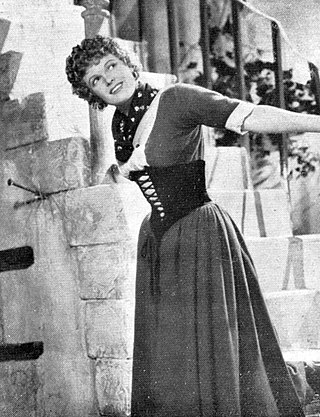
Dame Florence Marjorie Wilcox, known professionally as Anna Neagle, was an English stage and film actress, singer, and dancer.

Michael Charles Gauntlet Wilding was an English stage, television, and film actor. He is best known for a series of films he made with Anna Neagle; he also made two films with Alfred Hitchcock, Under Capricorn (1949) and Stage Fright (1950); and he guest starred on Hitchcock's TV show in 1963. He was married four times, including to Elizabeth Taylor, with whom he had two sons.

Margaret Mary Day Lockwood, CBE, was a British actress. One of Britain's most popular film stars of the 1930s and 1940s, her film appearances included The Lady Vanishes (1938), Night Train to Munich (1940), The Man in Grey (1943), and The Wicked Lady (1945). She was nominated for the BAFTA Award for Best British Actress for the 1955 film Cast a Dark Shadow. She also starred in the television series Justice (1971–74).
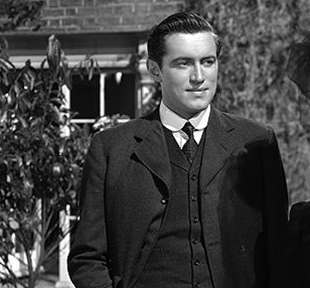
John Neil McCallum, was an Australian theatre and film actor, highly successful in the United Kingdom. He was also a television producer.
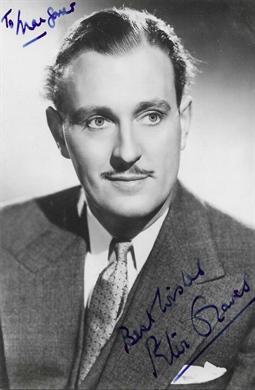
Peter George Wellesley Graves, 8th Baron Graves was an English actor.

Odette is a 1950 British war film based on the true story of Special Operations Executive French agent, Odette Sansom, living in England, who was captured by the Germans in 1943, condemned to death and sent to Ravensbrück concentration camp to be executed. However, against all odds she survived the war and testified against the prison guards at the Hamburg Ravensbrück trials. She was awarded the George Cross in 1946; the first woman ever to receive the award, and the only woman who has been awarded it while still alive.

Spring in Park Lane is a 1948 British romantic comedy film produced and directed by Herbert Wilcox which starred Anna Neagle, Michael Wilding and Tom Walls. Part of a series of films partnering Neagle and Wilding, it was the top film at the British box office in 1948 and remains the most popular entirely British-made film ever in terms of all-time attendance. It was shot at the Elstree Studios of MGM British, with sets designed by the art director William C. Andrews. Some location shooting also took place in London.

Herbert Sydney Wilcox CBE was a British film producer and director.

Susan Shaw was an English actress.

Patricia Roc was an English film actress, popular in the Gainsborough melodramas such as Madonna of the Seven Moons (1945) and The Wicked Lady (1945), though she only made one film in Hollywood, Canyon Passage (1946). She also appeared in Millions Like Us (1943), Jassy (1945), The Brothers (1947) and When the Bough Breaks (1947).
The Gainsborough melodramas were a sequence of films produced by the British film studio Gainsborough Pictures between 1943 and 1947 that conformed to a melodramatic style. The melodramas were not a film series but an unrelated sequence of films that had similar themes that were usually developed by the same film crew and frequently recurring actors who played similar characters in each. They were mostly based on popular books by female novelists and they encompassed costume dramas, such as The Man in Grey (1943) and The Wicked Lady (1945), and modern-dress dramas, such as Love Story (1944) and They Were Sisters (1945). The popularity of the films with audiences peaked mid-1940s when cinema audiences consisted primarily of women. The influence of the films led to other British producers releasing similarly themed works, such as The Seventh Veil (1945), Pink String and Sealing Wax (1945), Hungry Hill (1947), The White Unicorn (1947), Idol of Paris (1948), and The Reluctant Widow (1950) and often with the talent that made Gainsborough melodramas successful.

These Dangerous Years is a 1957 British drama musical film directed by Herbert Wilcox and starring George Baker, Frankie Vaughan, Carole Lesley, Thora Hird, Kenneth Cope, David Lodge and John Le Mesurier. It was written by Jack Trevor Story,

Piccadilly Incident is a 1946 British drama film directed by Herbert Wilcox and starring Anna Neagle, Michael Wilding, Coral Browne, Edward Rigby and Leslie Dwyer.

Maytime in Mayfair is a 1949 British musical romance film directed by Herbert Wilcox and starring Anna Neagle, Michael Wilding, Nicholas Phipps, and Tom Walls. It was a follow-up to Spring in Park Lane.
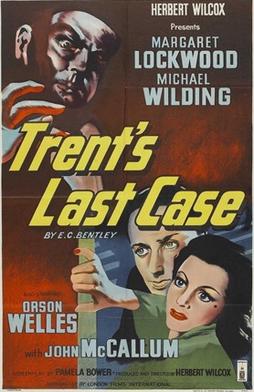
Trent's Last Case is a 1952 British detective film directed by Herbert Wilcox and starring Michael Wilding, Margaret Lockwood, Orson Welles and John McCallum. It was produced by Wilcox as part of a distribution agreement with Republic Pictures. It was based on the 1913 novel Trent's Last Case by E. C. Bentley, and had been filmed previously in the UK with Clive Brook in 1920, and in a 1929 US version.
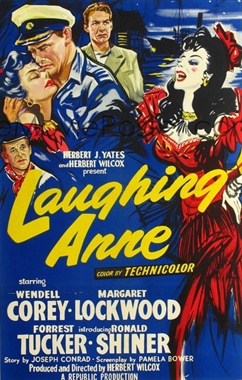
Laughing Anne is a 1953 British adventure film directed by Herbert Wilcox and starring Wendell Corey, Margaret Lockwood, Forrest Tucker, and Ronald Shiner. It was adapted from Joseph Conrad's short story, "Because of the Dollars" and from his 1923 two-act play, Laughing Anne. The film was shot at Shepperton Studios outside London. The film's sets were designed by the art director William C. Andrews and costumes were by Elizabeth Haffenden.

Peg of Old Drury is a 1935 British historical film directed by Herbert Wilcox and starring Anna Neagle, Cedric Hardwicke and Margaretta Scott. The film is a biopic of 18th century Irish actress Peg Woffington. It was based on the play Masks and Faces by Charles Reade and Tom Taylor. It contains passages of 18th century Shakespearian performance, from The Merchant of Venice, Richard III and As You Like It.

My Teenage Daughter is a 1956 British drama film directed by Herbert Wilcox and starring Anna Neagle, Sylvia Syms and Norman Wooland. The screenplay concerns a mother who tries to deal with her teenage daughter's descent into delinquency. It was intended as a British response to Rebel Without a Cause (1955). It was the last commercially successful film made by Wilcox.

Lilacs in the Spring is a 1954 British musical film directed by Herbert Wilcox and starring Anna Neagle, Errol Flynn and David Farrar. The film was made at Elstree Studios with sets designed by the art director William C. Andrews. Shot in Trucolor it was distributed in Britain by Republic Pictures. It was the first of two films Neagle and Flynn made together, the other being King's Rhapsody. It was released in the United States as Let's Make Up.
References
- 1 2 3 4 5 6 British Pathe - Daily Mail Film Awards 1946
- 1 2 3 4 British Pathe - Daily Mail Film Awards 1947
- 1 2 3 British Pathe - Daily Mail Film Awards 1948
- 1 2 3 British Pathe - Daily Mail Film Awards 1949
- 1 2 3 British Pathe - Daily Mail Film Awards 1950
- 1 2 3 British Pathe – Daily Mail Film Awards 1951